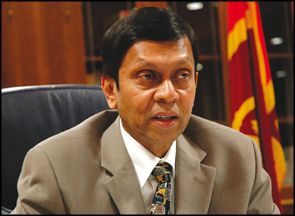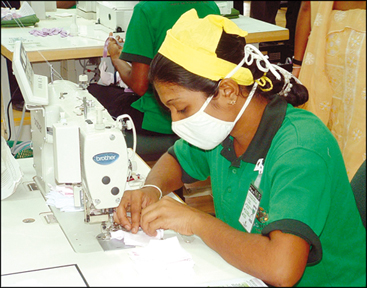|
Improving productivity vital for garment industry:
No GSP+: not end of world - Cabraal
by Gamini WARUSHAMANA
The non-availability of GSP+ concession from the European Union (EU)
is not going to be the end of the world as Sri Lanka can face the
situation, the Governor of the Central Bank Ajith Nivard Cabraal said in
Colombo last week, while delivering a lecture to journalists on the GSP+
issue. His analysis of the issue was on risk management point of view
and he said that one of the responsibilities of the Central Bank is to
assess the risk and plan to mitigate them.
 In September 2008 Sri Lanka applied for a renewal of the GSP facility
and in December EU decided to extend it for a further three years
subject to a review. In September 2008 Sri Lanka applied for a renewal of the GSP facility
and in December EU decided to extend it for a further three years
subject to a review.
The EU has submitted a rather controversial report as a part of this
review recently. The final decision of the EU will be taken after
considering the recommendation of the European Commission (EC).
Responding to the EC report Sri Lanka has appointed a committee
consisting of several Cabinet ministers to examine the possibility of
extending the facility. Sri Lanka exports goods to EU under the scheme
and a revision if any, can take place with a six month lag if the EC
decides not to extend the facility to Sri Lanka.
Cabraal sees more disadvantages in the GSP+ against the benefits of
the concession. According to him, the tariff concession received under
GSP+ is 6-7%.
This helps us to export goods to EU at a 7% lower price. The value of
the benefits to the buyers in the EU is approximately Euro 78 million
which is not a big amount. In 2008 around 66% of our apparel exports
benefitted from the GSP+, he said.
He said that the risks and disadvantages of the GSP+ are wide. It has
dampened the productivity improvement incentives as exporters get 7%
high price.
The high politicisation of the GSP+ scheme and use it as a tool to
cause fear in the minds of all stakeholders by the local political
parties is another disadvantage. They say that if there is a withdrawal
it would be a massive disaster to the country’s economy. That fear saps
our economic energy.
 The usage of this concession has been converted into a political
instrument by certain foreign governments. The uncertainty it created is
very damaging since the control of the concession is with certain
foreign governments which have sometimes been influenced by strong lobby
groups against Sri Lanka. The usage of this concession has been converted into a political
instrument by certain foreign governments. The uncertainty it created is
very damaging since the control of the concession is with certain
foreign governments which have sometimes been influenced by strong lobby
groups against Sri Lanka.
The negative vibrations to the economy on a regular basis of this
controversy discourages banks from confidently lending to exporters to
the EU, Cabraal said.
He acknowledged that the loss of Euro 78 million is a significant
amount to the foreign exchange but the CB has other options to earn this
amount.
He stressed that the same outcomes of the concession can be achieved
through different strategies.
He said that our export competitiveness to EU has increased sharply
due to the depreciation of Sri Lankan rupee.
The rupee has depreciated by 18.5% against Euro and 14.0% against
Sterling pound. In November 2008 and January 2009, despite the
appreciation of the rupee against these currencies Sri Lankan exports
remained competitive in the EU market.
Therefore, the potential loss of the preferential duty margin of 7%
if GSP+ facility is withdrawn will be well within the rupee depreciation
range and hence will not deal a crippling blow to Sri Lanka, Cabraal
stressed.
|

